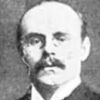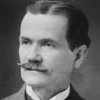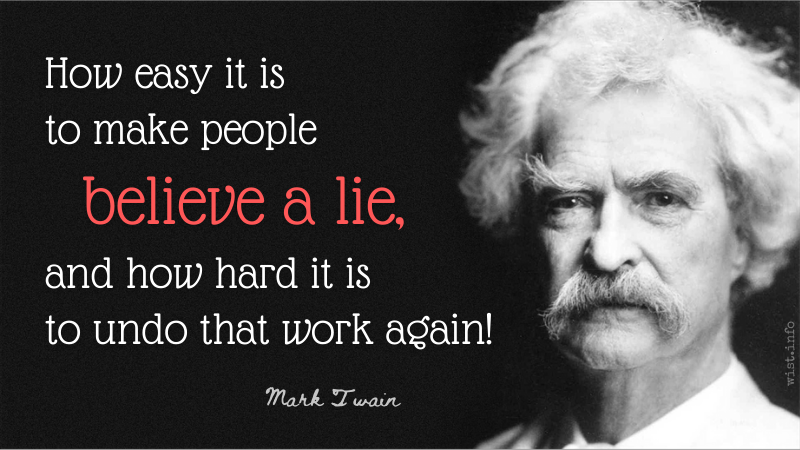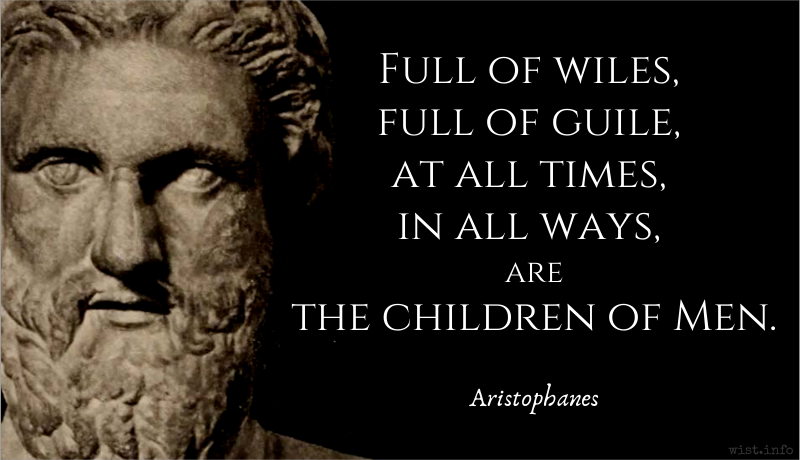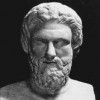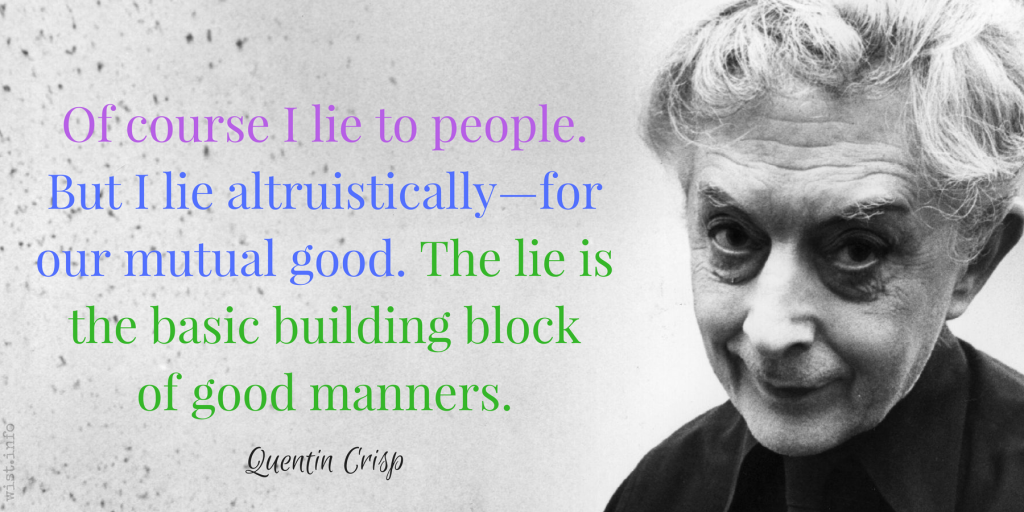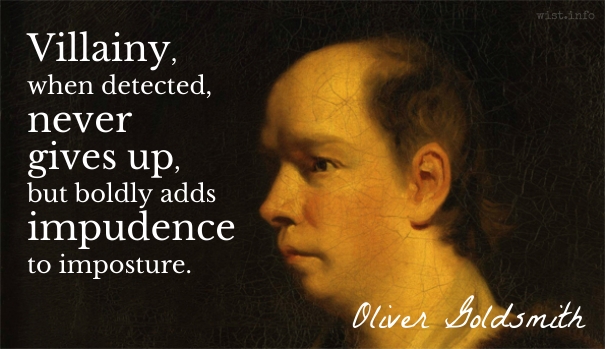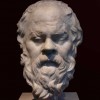Some have learnt many Tricks of sly Evasion,
Instead of Truth they use Equivocation,
And eke it out with mental Reservation,
Which to good Men is an Abomination.Benjamin Franklin (1706-1790) American statesman, scientist, philosopher, aphorist
Poor Richard (1736 ed.)
(Source)
Quotations about:
lying
Note not all quotations have been tagged, so Search may find additional quotes on this topic.
These statements were, as he felt even in making them, not only gratuitous, but utterly unconvincing, but he had arrived at that condition in which a man discovers with terror the unsuspected amount of mendacity latent in his system.
F. Anstey (1856-1934) English novelist and journalist (pseud. of Thomas Anstey Guthrie)
The Brass Bottle, ch. 9 “Persicos Odi, Puer, Apparatus” (1900)
(Source)
Originally published in The Strand Magazine (1900-04).
The great majority of us are required to live a life of constant, systematic duplicity. Your health is bound to be affected if, day after day, you say the opposite of what you feel, if you grovel before what you dislike and rejoice at what brings you nothing but misfortune. Your nervous system isn’t a fiction, it’s a part of your physical body, and your soul exists in space and is inside you, like the teeth in your head. You can’t keep violating it with impunity.
Boris Pasternak (1890-1960) Russian poet, novelist, and literary translator
Doctor Zhivago [До́ктор Жива́го], Part 2, ch. 15 “Conclusion,” sec. 6 [Yury] (1955) [tr. Hayward & Harari (1958), UK ed.]
(Source)
Alternate translations:
The great majority of us are required to live a life of constant, systematic duplicity. Your health is bound to be affected if, day after day, you say the opposite of what you feel, if you grovel before what you dislike and rejoice at what brings you nothing but misfortune. Our nervous system isn’t just a fiction, it’s a part of our physical body, and our soul exists in space and is inside us, like the teeth in our mouth. It can’t be forever violated with impunity.
[tr. Hayward & Harari (1958), US ed.]
A constant, systematic dissembling is required of the vast majority of us. It’s impossible, without its affecting your health, to show yourself day after day contrary to what you feel, to lay yourself out for what you don’t love, to rejoice over what brings you misfortune. Our nervous system is not an empty sound, not a fiction. It’s a physical body made up of fibers. Our soul takes up room in space and sits inside us like the teeth in our mouth. It cannot be endlessly violated with impunity.
[tr. Pevear & Volokhonsky (2010)]
Where this will end? In the Abyss, one may prophecy; whither all Delusions are, at all moments, traveling; where this Delusion has now arrived. For if there be a Faith, from of old, it is this, as we often repeat, that no Lie can live for ever. The very Truth has to change its vesture, from time to time; and be born again. But all Lies have sentence of death written down against them, and Heaven’s Chancery itself; and, slowly or fast, advance incessantly towards their hour.
Thomas Carlyle (1795-1881) Scottish essayist and historian
The French Revolution: A History, Part 1, Book 6, ch. 3 (1.6.3) (1837)
(Source)
Carlyle is speaking of the delusion that the wealthy and land-owners of pre-Revolutionary France could forever oppress their tenants with taxes and rent without finally driving them to bloody revolution.
A core phrase here was latched onto by Martin Luther King, Jr., who incorporated it as standard fare in his speeches in the mid- and late 1960s.
We shall overcome, because Carlyle is right, "No lie can live forever."
[Examples: 1, 2, 3, 4]
Yes, it is always the best policy to speak the truth — unless, of course, you are an exceptionally good liar.
Jerome K. Jerome (1859-1927) English writer, humorist [Jerome Klapka Jerome]
Idler Magazine, “The Idler’s Club” column (1892-02)
(Source)
After a hard night of it two old friends fell into a sleepy conversation in the steam-room of a Turkish bath.
“My wife loves me so much,” said one, “that she’ll believe me when I tell her I was kept downtown all night by business.”
“My wife loves me so much,” said the other, “that I won’t be afraid to tell her the truth.”H. L. Mencken (1880-1956) American writer and journalist [Henry Lewis Mencken]
A Little Book in C Major, ch. 1, § 10 (1916)
(Source)
Those who believe it permissible to tell white lies soon grow color-blind.
Austin O'Malley (1858-1932) American ophthalmologist, professor of literature, aphorist
Keystones of Thought (1914)
(Source)
Fraud, which so gnaweth at all men’s conscience,
A man may use on one who trusts him best
And on him also who risks no confidence.
This latter mode seems only to arrest
The love which Nature meaneth to endure;
Hence in the second circle huddled nest
Hypocrisy, flattery; they who would conjure
By spells; and simony; the thief, the cheat,
Pandars and barrators, and the like ordure.[La frode, ond’ogne coscïenza è morsa,
può l’omo usare in colui che ‘n lui fida
e in quel che fidanza non imborsa.
Questo modo di retro par ch’incida
pur lo vinco d’amor che fa natura;
onde nel cerchio secondo s’annida
ipocresia, lusinghe e chi affattura,
falsità, ladroneccio e simonia,
ruffian, baratti e simile lordura.]Dante Alighieri (1265-1321) Italian poet
The Divine Comedy [Divina Commedia], Book 1 “Inferno,” Canto 11, l. 52ff (11.52-60) [Virgil] (1309) [tr. Binyon (1943)]
(Source)
On the punishment of common fraudsters, who do not betray a personal trust but only the natural love of humanity. This is still deemed worse, in Dante's cosmology, than deadly "bestial" violence.
Barratry is the sale of justice, employment, or public offices, going alongside simony, the sale of holy offices.
(Source (Italian)). Alternate translations:
That Fraud of which each Conscience feels the pangs
Man may commit 'gainst those who do confide
In him, as well as those who trust him not.
The first unhappily destroys the Bond
In general by Nature form'd: from whence
Confined in the second Circle are
The Hypocrites, the Flatterers, and they
Who practice Coz'ning, Sorcery, and Theft,
Base Simony, procuring with a smile,
Masked Deceit, and all such filthy tricks.
[tr. Rogers (1782), l. 53ff]
Fraud skulks below with all her various brood,
There darkling dwell the foes of public good.
The pilf'rer, and the cheat, his dark ally:
With those, whose felon hand their trust betray'd,
Hypocrisy in faintly garb array'd.
Corruption foul, and frontless Perjury.
[tr. Boyd (1802), st. 8]
Fraud, that in every conscience leaves a sting,
May be by man employ’d on one, whose trust
He wins, or on another who withholds
Strict confidence. Seems as the latter way
Broke but the bond of love which Nature makes.
Whence in the second circle have their nest
Dissimulation, witchcraft, flatteries,
Theft, falsehood, simony, all who seduce
To lust, or set their honesty at pawn,
With such vile scum as these.
[tr. Cary (1814)]
Fraud, to the stricken conscience inly known,
Might man devise on him who faith disbursed,
And eke on him who credence had not shown.
The bond of love which nature framed at first.
But only that, the latter mode hath slain,
Whence nesting in the second orb lie curst
Hypocrites, and flatterers, and the wizard train,
Falseness, and simonies, and pilferers' trade,
Panders, and cheats, and all of foulest stain.
[tr. Dayman (1843)]
Fraud, which gnaws every conscience, a man may practice upon one who confides in him; and upon him who reposes no confidence.
This latter mode seems only to cut off the bond of love which Nature makes: hence in the second circle nests
hypocrisy, flattery, sorcerers, cheating, theft and simony, pandars, barrators, and like filth.
[tr. Carlyle (1849)]
And fraud, that every conscience can corrode --
Fraud may be practiced against them who trust,
And those who put no confidence in dust.
This seems to come behind, it only slays
The kindly chains of love that nature binds
Hence, in the lower circle, station finds
Hypocrisy, flattery and sorcery;
Falsification, robbery, simony,
Seduction, quarrels, and brutality.
[tr. Bannerman (1850)]
That fraud, which sharply, ev'ry conscience bites,
Man against those who trust in him may use,
Or against those by whom no trust is giv'n.
This latter seems to rend in twain the bond
Which Nature in her love for us hath made;
Whence in the second circle such are held;
Magic, hypocrisy, and flatters,
Vile falsehood, robbery and simony,
Panders and Userers, and such foul stuff.
[tr. Johnston (1867)]
Fraud, wherewithal is every conscience stung,
A man may practise upon him who trusts,
And him who doth no confidence imburse.
This latter mode, it would appear, dissevers
Only the bond of love which Nature makes;
Wherefore within the second circle nestle
Hypocrisy, flattery, and who deals in magic,
Falsification, theft, and simony,
Panders, and barrators, and the like filth.
[tr. Longfellow (1867)]
The fraud, wherewith every conscience is pricked, man can practise towards the one who trusts him, and towards him who has no confidence in store. This latter mode seems to destroy only the bond of love that nature makes; whence in the second circle have their nests hypocrisy, flatteries, and whoso uses arts; forgery, robbery, and simony; pandars, jobbers, and suchlike filth.
[tr. Butler (1885)]
Such fraud, for which all must compunction feel.
Can man exert 'gainst him whose trust he shares,
And him whose thoughts no confidence reveal.
This latter fashion all unseemly tears
The golden chain of love which Nature weaves.
Whence gather in the second circle's lairs
Hypocrisy, all flattery that deceives,
Witchcraft, lies, thefts, the Simoniac blot.
Panders, chicaners, and all similar thieves.
[tr. Minchin (1885)]
Fraud, by which every conscience is bitten, man may practice on one that confides in him, or on one that owns no confidence. This latter mode seemeth to destroy only the bond of love that nature makes; wherefore in the second circle nestle hypocrisy, flatteries, and sorcerers, falsity, robbery, and simony, panders, barrators, and such like filth.
[tr. Norton (1892)]
Fraud, with which there is no conscience but is bitten, a man may practise upon one who putteth his trust in him; and upon one who giveth no credit for fidelity. This last kind seemeth only to sever the bond of love which nature weaveth; and therefore is it that in the second circle there nestle hypocrisy, flattery, workers of sorcery, treachery, robbery and simony, panders, barrators, and such-like refuse.
[tr. Sullivan (1893)]
Fraud, wherewithal is bitten every conscience,
A man may use regarding one who trusts him,
Or one who has no store of trust to deal with.
This latter way, as it would seem, slays only
The tie of love that nature itself fashions;
Whence make their nest within the second circle
Hypocrisy, smooth speeches, and bewitchment,
Forgery, thieving, and the sin of Simon,
Panders, and jobbers, and the like offscouring.
[tr. Griffith (1908)]
Fraud, which always stings the conscience, a man may practice on one who confides in him or on one who does not so place his confidence; it is evident that this latter way destroys simply the bond of love which nature makes, so that in the next circle, hypocrisy, flatteries, sorceries, falsifications, theft, and simony, panders, jobbers, and like filth have their nest.
[tr. Sinclair (1939)]
Fraud, which gnaws at every conscience, may be a breach
Of trust against the confiding, or deceive
Such as repose no confidence; though each
Is fraud, the latter sort seems but to cleave
The general bond of love and Nature's tie;
So the second circle opens to receive
Hypocrites, flatterers, dealers in sorcery,
Panders and cheats, and all such filthy stuff,
With theft, and simony and barratry.
[tr. Sayers (1949)]
Fraud, which is a canker to every conscience,
may be practiced by a man on those who trust him,
and on those who have reposed no confidence.
This latter mode seems only to deny
the bond of love which all men have from Nature;
therefore within the second circle lie
simoniacs, sycophants, and hypocrites,
falsifiers, thieves, and sorcerers,
grafters, pimps, and all such filthy cheats.
[tr. Ciardi (1954)]
Fraud, which gnaws at every conscience, a man may practice upon one who trusts in him, or upon one who reposes no condifence. This altter way seems to sever only the bond of love which nature makes; wherefore in the second circle hypocrisy, flatteries, sorcerers, falsity, theft, simony, panders, barratry, and like filth have their nest.
[tr. Singleton (1970)]
Fraud, that gnaws the conscience of its servants,
can be used on one who puts his trust in you
or else on one who has no trust invested.
This latter sort seems only to destroy
the bond of love that Nature gives to man;
so in the second circle there are nests
of hypocrites, flatterers, dabblers in sorcery,
falsifiers, thieves and simonists,
panders, seducers, grafters and like filth.
[tr. Musa (1971)]
Now fraud, that eats away at every conscience,
is praticed by a man against another
who trusts in him, or one who has no trust.
This latter way seems only to cut off
the bond of love that nature forges; thus,
nestled within the second circle are:
hypocrisy and flattery, sorcerers,
and falsifiers, simony, and theft,
and barrators and panders and like trash.
[tr. Mandelbaum (1980)]
Fraud, by which every conscience is bitten,
A man may practice on a person who trusts him
Or upon one who has no confidence in him.
This latter mode cuts only the bond of love
Which nature itself establishes;
And so there are, lodged in the second circle,
Hypocrisy, flatterers, and those who delude,
Falsity, thieving and simony,
Pimps, trouble-makers, and all such-like scum.
[tr. Sisson (1981)]
Fraud, which bites every conscience, a man may play
Either on one who trusts him, or one who does not.
The latter of the two is seen to destroy
Only those bonds of love that nature makes:
So in the second circle hypocrisy,
Flatterers, sorcery, larceny, simoniacs,
With pimps, barrators, and such filth have their nest.
[tr. Pinsky (1994), ll. 53-59]
Fraud, which bites at every mind, a man can use against one who trusts in him or against one who has in his purse no cause for trust.
This latter mode seems to cut solely into the bond of love that Nature makes; thus in the second circle find their nest
hypocrisy, flattery, casters of spells, impersonators, thievery and simony, panders, embezzlers, and similar filth.
[tr. Durling (1996)]
Human beings may practise deceit, which gnaws at every conscience, on one who trusts them, or on one who places no trust. This latter form of fraud only severs the bond of love that Nature created, and so, in the eighth circle, are nested hypocrisy; sorcery; flattery; cheating; theft and selling of holy orders; pimps; corrupters of public office; and similar filth.
[tr. Kline (2002)]
As for deceit -- which gnaws all rational minds --
we practise this on those who trust in us,
or those whose pockets have no room for trust.
Fraud of the second kind will only gash
the ligature of love that Nature forms:
and therefore in great Circle Two there nests
smarm and hypocrisy, the casting-up of spells,
impersonation, thievery, crooked priests,
embezzlement and pimping, such like scum.
[tr. Kirkpatrick (2006)]
Fraud gnaws at every conscience,
whether used on him who trusted
or on one who lacked such faith.
Fraud against the latter only severs
the bond of love that nature makes.
Thus in the second circle nest
hypocrisy, flatteries, and sorcerers;
lies, theft, and simony;
panders, barrators, and all such filth.[tr. Hollander/Hollander (2007)]
Fraud will gnaw at the conscience, but a man may bury
His heart and cheat the people who believe in him --
But trust's not needed, just opportunity.
This sinning slices away the soft-tied tether
Of love, prepared for us by Nature. The second
Circle is therefore a nest for flatterers
And hypocrites and liars, and those who press
Illiterate fools for high Church office, well-paid
For their filthy work, and bawds, and all such festering
Sores.
[tr. Raffel (2010)]
Fraud eats the conscience, whether used against
Those who trust us, or those who trust us not.
In the latter case, the bonds of love dispensed
By nature are undone. Thus you have got,
In Circle Eight, toadies and hypocrites,
Magicians, forgers, thieves, thugs, dealers in
Holy preferment, everything that fits
The definition of sheer filth.
[tr. James (2013)]
“All stories are true,” Skarpi said. “But this one really happened, if that’s what you mean.” He took another slow drink, then smiled again, his bright eyes dancing. “More or less. You have to be a bit of a liar to tell a story the right way. Too much truth confuses the facts. Too much honesty makes you sound insincere.”
Patrick Rothfuss (b. 1973) American author
The Name of the Wind, ch. 26 “Lanre Turned” (2007)
(Source)
Oh child, words well spoken might be false,
and with the beauty of words, might conquer truth;
yet this is not the surest test, that is character
and right; he who conquers with his fluency,
he is clever, but I hold facts mightier than words, always.[ὦ παῖ, γένοιντ᾽ἂν εὖ λελεγµένοι λόγοι
ψευδεῖς, ἐπῶν δὲ κάλλεσιν νικῷεν ἂν
τἀληθές· ἀλλ᾽οὐ τοῦτο τἀκριβέστατον,
ἀλλ᾽ἡ φύσις καὶ τοὐρθόν· ὃς δ᾽εὐγλωσσίᾳ
νικᾷ, σοφὸς µέν, ἀλλ᾽ἐγὼ τὰ πράγµατα
κρείσσω νοµίζω τῶν λόγων ἀεί ποτε.]Euripides (485?-406? BC) Greek tragic dramatist
Antiope [Αντιοπη], frag. 206 (Kannicht) [Antiope/ΑΝΤΙΟΠΗ?] (c. 410 BC) [tr. Will (2015)]
(Source)
(Source (Greek)). TGF frag. 205.
You injure yourself by your own vindictiveness, and give your enemies too great an advantage, if you accuse them of things that are not true, and tell lies in order to disparage them.
[C’est se venger contre soi-même, et donner un trop grand avantage à ses ennemis, que de leur imputer de choses qui ne sont pas vraies, et de mentir pour les décrier.]
Jean de La Bruyère (1645-1696) French essayist, moralist
The Characters [Les Caractères], ch. 11 “Of Mankind [De l’Homme],” § 150 (11.150) (1688) [tr. Stewart (1970)]
(Source)
(Source (French)). Alternate translations:
We are reveng'd on our selves, and give our Enemies too much advantage over us, when we say things of them which are not true, and lie to reproach 'em.
[Bullord ed. (1696)]
'Tis reproaching our selves, and giving our Enemies too much advantage over us, to say things of them which are not true, and lie to disparage them.
[Curll ed. (1713)]
We are vindictive to our own loss, and give the Staff into our Enemies Hands, when we say things of them which are not true, and lie to defame them.
[Browne ed. (1752)]
To say things of our enemies which are not true, and to lie to defame them, is to avenge ourselves on ourselves, and give them too great an advantage over us.
[tr. Van Laun (1885)]
Folly is either related to, or identical with, the family of Lies, for in both cases it needs many to support one.
[Excusar una impertinencia con otra mayor es de casta de mentira, o esta lo es de necedad, que para sustentarse una necesita de muchas.]
Baltasar Gracián y Morales (1601-1658) Spanish Jesuit priest, writer, philosopher
The Art of Worldly Wisdom [Oráculo Manual y Arte de Prudencia], § 214 (1647) [tr. Jacobs (1892)]
(Source)
(Source (Spanish)). Alternate translations:
Foppishness is of the race of Lying, or this of the race of that: to make good one, there is need of a great many others.
[Flesher ed. (1685)]
Folly is either of the house of lies, or lies are the house of folly, for in order to stand, each needs the support of many.
[tr. Fischer (1937)]
They say one lie leads to another, greater one, and it is the same with folly.
[tr. Maurer (1992)]
IMOGEN:O,
Dissembling courtesy! How fine this tyrant
Can tickle where she wounds!William Shakespeare (1564-1616) English dramatist and poet
Cymbeline, Act 1, sc. 1, l. 97ff (1.1.97-99) (1611)
(Source)
When words stop meaning anything, when truth doesn’t matter, when people can just lie with abandon, democracy can’t work.
Barack Obama (b. 1961) American politician, US President (2009-2017)
Speech, Miami (2 Nov 2018)
(Source)
The rules are simple: they lie to us, we know they’re lying, they know we know they’re lying but they keep lying anyway, and we keep pretending to believe them.
Elena Gorokhova (b. 1955) Russo-American novelist, linguist, educator
A Mountain of Crumbs: A Memoir, ch. 13 (2010)
(Source)
On the relationship between the Soviet government and media and the Soviet people. Sometimes attributed to Aleksandr Solzhenitsyn.
Only Truth can give true reputation: only reality can be of real profit. One deceit needs many others and so the whole house is built in the air and must soon come to the ground.
[Sola la verdad puede dar reputación verdadera, y la substancia entra en provecho. Un embeleco ha menester otros muchos, y así toda la fábrica es quimera, y como se funda en el aire es preciso venir a tierra.]Baltasar Gracián y Morales (1601-1658) Spanish Jesuit priest, writer, philosopher
The Art of Worldly Wisdom [Oráculo Manual y Arte de Prudencia], § 175 (1647) [tr. Jacobs (1892)]
(Source)
(Source (Spanish)). Alternate translations:
Nothing but truth can give a true Reputation; and nothing but substance turns to account. One cheat stands in need of a great many others, and by consequent, the whole building is but imaginary: and seeing it is founded in the air, it must of necessity fall to the ground.
[Flesher ed. (1685)]
Only truth can bestow a true reputation, and only solid character prove profitable; one fraud makes necessary another and more; and so the whole of what is built up is flimsy, and as it rests upon air, it is destined to return to earth.
[tr. Fischer (1937)]
Only the truth can give you a true reputation, and only substance is profitable. One act of deceit begets many others, and soon the whole ghastly construction, which is founded in the air, comes tumbling down.
[tr. Maurer (1992)]
Tarvek thought about lying, but the first rule of lying was in knowing when you had a shot at getting away with it.
Phil Foglio (b. 1956) American writer, cartoonist
Agatha H. and the Siege of Mechanicsburg (2020) [with Kaja Foglio]
(Source)
Stories may well be lies, but they are good lies that say true things, and which can sometimes pay the rent.
Neil Gaiman (b. 1960) British author, screenwriter, fabulist
Blog entry (2004-11-17), “Politics, Portugal and No Gumbo-Limbo Trees”
(Source)
When asked what people gain by telling likes, he replied, “That when they tell the truth they are not believed.”
[ἐρωτηθεὶς τί περιγίνεται κέρδος τοῖς ψευδομένοις, “ὅταν,” ἔφη, “λέγωσιν ἀληθῆ, μὴ πιστεύεσθαι.”]
Aristotle (384-322 BC) Greek philosopher
Attributed in Diogenes Laërtius, Lives and Opinions of Eminent Philosophers, Book 5. [tr. Mensch (2018)]
(Source)
Original Greek. Alternate translations:
He was once asked, what those who tell lies gain by it; “They gain this,” said he, “that when they speak truth they are not believed.”
[tr. Yonge (1853), sec. 11]
To the question, "What do people gain by telling lies?" his answer was, "Just this, that when they speak the truth they are not believed."
[tr. Hicks (1925), sec. 17]
There is another sort of lies, inoffensive enough in themselves, but wonderfully ridiculous; I mean those lies which a mistaken vanity suggests, that defeat the very end for which they are calculated, and terminate in the humiliation and confusion of their author, who is sure to be detected. These are chiefly narrative and historical lies, all intended to do infinite honor to their author. He is always the hero of his own romances; he has been in dangers from which nobody but himself ever escaped; he as seen with his own eyes, whatever other people have heard or read of; he has had more bonnes fortunes than ever he knew women; and has ridden more miles post in one day, than ever courier went in two. He is soon ridiculed, and as soon becomes the object of universal contempt and ridicule.
Lord Chesterfield (1694-1773) English statesman, wit [Philip Dormer Stanhope]
Letter to his son, #126 (21 Sep 1747)
(Source)
If everybody always lies to you, the consequence is not that you believe the lies, but rather that nobody believes anything any longer. This is because lies, by their very nature, have to be changed, and a lying government has constantly to rewrite its own history. On the receiving end you get not only one lie — a lie which you could go on for the rest of your days — but you get a great number of lies, depending on how the political wind blows. And a people that no longer can believe anything cannot make up its mind. It is deprived not only of its capacity to act but also of its capacity to think and to judge. And with such a people you can then do what you please.
Hannah Arendt (1906-1975) German-American philosopher, political theorist
Interview with Roger Errera (Oct 1973), The New York Review of Books (26 Oct 1978)
(Source)
Who dares think one thing, and another tell,
My heart detests him as the gates of hell.[Ἐχθρὸς γάρ μοι κεῖνος ὁμῶς Ἀΐδαο πύλῃσιν
ὅς χ’ ἕτερον μὲν κεύθῃ ἐνὶ φρεσίν, ἄλλο δὲ εἴπῃ.]Homer (fl. 7th-8th C. BC) Greek author
The Iliad [Ἰλιάς], Book 9, l. 312ff (9.312-313) [Achilles to Odysseus] (c. 750 BC) [tr. Pope (1715-20)]
(Source)
Original Greek. Alt. trans.:
For, like hell mouth I loath, Who holds not in his words and thoughts one indistinguish’d troth. [tr. Chapman (1611), ll. 300-01]
For I abhor the man, not more the gates Of hell itself, whose words belie his heart. [tr. Cowper (1791), ll. 385-86]
Hateful to me as the gates of Hades is he who conceals one thing in his mind and utters another. [tr. Buckley (1860)]
Him as the gates of hell my soul abhors,
Whose outward words his inmost thoughts conceal.
[tr. Derby (1864), ll. 373-74]
For hateful to me even as the gates of hell is he that hideth one thing in his heart and uttereth another. [tr. Leaf/Lang/Myers (1891)]
Him do I hate even as the gates of hell who says one thing while he hides another in his heart.
[tr. Butler (1898)]
I hate
as I hate Hell's own gate that man who hides
one thought within him while he speaks another.
[tr. Fitzgerald (1974), l. 381ff]I hate that man like the very Gates of Death
who says one thing but hides another in his heart.
[tr. Fagles (1990), ll. 378-79]
How easy it is to make people believe a lie, and how hard it is to undo that work again!
Mark Twain (1835-1910) American writer [pseud. of Samuel Clemens]
Dictation (2 Dec 1906), The Autobiography of Mark Twain, Vol. 2 (2013)
(Source)
A sentiment that may be behind the spurious Twain quotation, "It's easier to fool people than to convince them that they have been fooled."
It would never come into their [the masses’] heads to fabricate colossal untruths, and they would not believe that others could have the impudence to distort the truth so infamously. Even though the facts which prove this to be so may be brought clearly to their minds, they will still doubt and waver and will continue to think that there may be some other explanation. For the grossly impudent lie always leaves traces behind it, even after it has been nailed down, a fact which is known to all expert liars in this world and to all who conspire together in the art of lying.
Indeed rhetoricians are permitted to lie about historical matters so they can speak more subtly.
[Quidem concessum est rhetoribus ementiri in historiis ut aliquid dicere possint argutius.]
Marcus Tullius Cicero (106-43 BC) Roman orator, statesman, philosopher
Brutus, sec. 42 (46 BC)
Alt. trans.:
- "Orators are indeed permitted to lie about historical matters so they can speak more subtly."
- "For it is the privilege of rhetoricians to exceed the truth of history, that they may have an opportunity of embellishing the fate of their heroes." [tr. Jones (1776)]
- "Fabrication's certainly allowed when practitioners of rhetoric write history, to frame a point more cleverly." [tr. Kaster (2020)]
Politics demands a great capacity for self-deception, which rescues the politician from hypocrisy. He can normally manage to believe what he is saying for the time it takes him to say it. This gives him a certain sincerity even when he is saying opposite things to opposite people.
Garry Wills (b. 1934) American author, journalist, historian
Confessions of a Conservative, ch. 15 (1979)
(Source)
Lying is an indispensable part of making life tolerable.
Bergen Evans (1904-1978) American educator, writer, lexicographer
Quoted in “The Euphemism: Telling It Like It Isn’t,” Time (19 Sep 1969)
(Source)
Sometimes misquoted with the words "Euphemisms persist because," but these are non-quoted text leading up to the quotation.
Mass propaganda discovered that its audience was ready at all times to believe the worst, no matter how absurd, and did not particularly object to being deceived because it held every statement to be a lie anyhow. The totalitarian mass leaders based their propaganda on the correct psychological assumption that, under such conditions, one could make people believe the most fantastic statements one day, and trust if the next day they were given irrefutable proof of their falsehood, they would take refuge in cynicism; instead of deserting the leaders who had lied to them, they would protest that they had known all along the statement was a lie and would admire the leaders for their superior tactical cleverness.
Hannah Arendt (1906-1975) German-American philosopher, political theorist
The Origins of Totalitarianism, Part 3, ch. 11 “The Totalitarian Movement,” sec. 2 (1951)
(Source)
CHORUS: Full of wiles, full of guile, at all times, in all ways, are the children of Men.
[δολερὸν μὲν ἀεὶ κατὰ πάντα δὴ τρόπον / πέφυκεν ἄνθρωπος]
Aristophanes (c. 450-c. 388 BC) Athenian comedic playwright
The Birds, ll. 451-2 (414 BC) [tr. Rogers (1906)]
(Source)
Alt. trans.:
- "Man naturally is deceitful, ever indeed, and always, in every one thing." [tr. Warter (1830)]
- "Man is naturally deceitful ever, in every way!" [tr. Hickie (1853)]
- "Man is a truly cunning creature." [abridged tr. O'Neill (1938)]
- "A treacherous thing always in every way is human nature." [tr. Henderson (1998)]
Of course I lie to people. But I lie altruistically — for our mutual good. The lie is the basic building block of good manners. That may seem mildly shocking to a moralist — but then what isn’t?
Quentin Crisp (1908-1999) English writer and raconteur [b. Denis Pratt]
Manners from Heaven: A Divine Guide to Good Behavior (1984)
(Source)
Villainy, when detected, never gives up, but boldly adds impudence to imposture.
Oliver Goldsmith (1730-1774) Irish poet, playwright, novelist
“A City Night-Piece,” The Bee, #4 (27 Oct 1759)
(Source)
The more lies are told, the more important it becomes for the liars to justify themselves by deep moral commitments to high-sounding objectives that mask the pursuit of money and power.
I fear one lies more to one’s self than to anyone else.
An Ambassador is an honest man, sent to lie abroad for the good of his country.
[Legatus est vir bonus, peregrè missus ad mentiendum Reipublicae causâ.]
Henry Wotton (1568-1639) English author, diplomat, politician
Reliquiae Wottonainae (1651)
(Source)
Wotton wrote in an apology to Velserus in 1612, that during his travel through Augsburg in 1604, "This merry definition of an ambassador I had chanced to set down at my friend's, Mr. Christopher Fleckamore, in his Album". It seems to have been intended as a pun when translated to English. Sometimes translated as "An ambassador is an honest gentleman sent to lie abroad for the good of his country."
A man who himself does not believe what he tells another … has even less worth than if he were a mere thing. For a thing, as something real and given, has the property of being serviceable. … But the man who communicates his thoughts to someone in words which yet (intentionally) contain the contrary of what he thinks on the subject has a purpose directly opposed to the natural purposiveness of the power of communicating one’s thoughts, and therefore renounces his personality and makes himself a mere deceptive appearance of man, not man himself.
Another and more special provision has been made by one of the amendments to the Constitution, which expressly declares, that “Congress shall make no law respecting an establishment of religion, or prohibiting the free exercise thereof, or abridging the freedom of speech, or of the press,” thereby guarding, in the same sentence, and under the same words, the freedom of religion, of speech, and of the press, insomuch that whatever violated either throws down the sanctuary which covers the others, — and that libels, falsehood, and defamation, equally with heresy and false religion, are withheld from the cognizance of federal tribunals.
Thomas Jefferson (1743-1826) American political philosopher, polymath, statesman, US President (1801-09)
“Kentucky Resolutions,” Resolution 3 (1798)
(Source)
In protest of the Alien and Sedition Acts.
We lie loudest when we lie to ourselves.
Eric Hoffer (1902-1983) American writer, philosopher, longshoreman
The Passionate State of Mind, Aphorism 70 (1955)
(Source)
For the trouble with lying and deceiving is that their efficiency depends entirely upon a clear notion of the truth that the liar and deceiver wishes to hide. In this sense, truth, even if it does not prevail in public, possesses an ineradicable primacy over all falsehoods.
Hannah Arendt (1906-1975) German-American philosopher, political theorist
“Lying in Politics,” Crises of the Republic (1969)
(Source)
All this was inspired by the principle — which is quite true in itself — that in the big lie there is always a certain force of credibility; because the broad masses of a nation are always more easily corrupted in the deeper strata of their emotional nature than consciously or voluntarily; and thus in the primitive simplicity of their minds they more readily fall victims to the big lie than the small lie, since they themselves often tell small lies in little matters but would be ashamed to resort to large-scale falsehoods.
If falsehood, like truth, had but one face, we should be better off, for we should take for certain the contrary of what the liar said. But the opposite of truth has a hundred thousand shapes and a limitless field.
[Si comme la verité, le mensonge n’avoit qu’un visage, nous serions en meilleurs termes : car nous prendrions pour certain l’opposé de ce que diroit le menteur. Mais le revers de la verité a cent mille figures, et un champ indefiny.]
Michel de Montaigne (1533-1592) French essayist
Essays, Book 1, ch. 9 “On Liars [Des Menteurs]” (1572) (1.9) (1595) [tr. Ives (1925)]
(Source)
(Source (French)). Alternate translations:
If a lie had no more faces but one, as truth hath; we should be in farre better termes then we are: For, whatsoever a lier should say, we would take it in a contrarie sense. But the opposite of truth hath many-many shapes, and an undefinite field.
[tr. Florio (1603)]
If Falshood had, like Truth, but one Face only, we should be upon better Terms; for we should then take the contrary to what the Lyer says for certain Truth; but the Reverse of Truth has a hundred thousand Figures, and a Field indefinite without Bound or Limit.
[tr. Cotton (1686)]
If Falsehood had, like Truth, only one face, we should be upon better terms; for we should then take the contrary of what the liar should say for certain truth; but the reverse of truth has a hundred thousand forms, and a field without limits.
[tr. Friswell (1868)]
If falsehood had, like truth, but one face only, we should be upon better terms; for we should then take for certain the contrary to what the liar says: but the reverse of truth has a hundred thousand forms, and a field indefinite, without bound or limit.
[tr. Cotton/Hazlitt (1877)]
If falsehood, like truth, had only one face, we would be in better shape. For we would take as certain the opposite of what the liar said. But the reverse of truth has a hundred thousand shapes and a limitless field.
[tr. Frame (1943)]
If a lie, like truth, had only one face we could be on better terms, for certainty would be the reverse of what the liar said. But the reverse side of truth has a hundred thousand shapes and no defined limits.
[tr. Screech (1987)]
If, like truth, falsehood had only one face, we would be better off. We could trust that the opposite of whatever a liar says is true. But the flip side of the truth is endless and has a hundred thousand faces.
[tr. HyperEssays (2023)]
The cruelest lies are often told in silence. A man may have sat in a room for hours and not opened his teeth, and yet come out of that room a disloyal friend or a vile calumniator.
Robert Louis Stevenson (1850-1894) Scottish essayist, novelist, poet
Virginibus Puerisque, “Virginibus Puerisque,” sec. 4 (1881)
(Source)
The income tax has made more liars out of the American people than golf has. Even when you make a tax form out on the level, you don’t know when it’s through if you are a crook or a martyr.
Will Rogers (1879-1935) American humorist
Column (1923-04-07), “Weekly Article: Helping Girls With Their Income Tax”
(Source)
Collected by Rogers in The Illiterate Digest (1924).
You may fool all the people some of the time; you can even fool some of the people all the time; but you can’t fool all of the people all the time.
Abraham Lincoln (1809-1865) American lawyer, politician, US President (1861-65)
(Attributed)
A possible precursor to this quote is the widely-republished Jacques Abbadie, "Traité de la Vérité de la Religion Chrétienne," ch. 2 (1684): "One can fool some men, or fool all men in some places and times, but one cannot fool all men in all places and ages. [… ont pû tromper quelques hommes, ou les tromper tous dans certains lieux & en certains tems, mais non pas tous les hommes, dans tous les lieux & dans tous les siécles.]" A similar passage was used in Denis Diderot and Jean le Rond d’Alembert, ed., Encyclopédie: ou Dictionnaire Raisonné des Sciences, des Arts et des Métiers, Vol. 4 (1754).
First attributed to Lincoln by Fred F. Wheeler, interviewed in the Albany Times (8 Mar 1886): "You can fool part of the people some of the time, you can fool some of the people all of the time, but you cannot fool all the people all of the time."
First cited in detail in Alexander K. McClure, “Abe” Lincoln’s Yarns and Stories, (1904), in the above form; it was cited as a speech in Clinton, Ill. (2 Sep 1858), but the passage is not found in any surviving Lincoln documents. No Lincoln reference is found in contemporary writings.
Also attributed to P.T. Barnum and Bob Dylan. See also Lawrence J. Peter. More detailed discussion of the quotation can be found here.
FALSTAFF: Lord, Lord, how this world is given to lying!
William Shakespeare (1564-1616) English dramatist and poet
Henry IV, Part 1, Act 5, sc. 4, l. 148 (5.4.148) (1597)
(Source)
Oh, life is a glorious cycle of song,
A medley of extemporanea;
And love is a thing that can never go wrong;
And I am Marie of Roumania.Dorothy Parker (1893-1967) American writer
“Comment,” New York World (16 Aug 1925)
(Source)
Reprinted in Enough Rope (1926)


